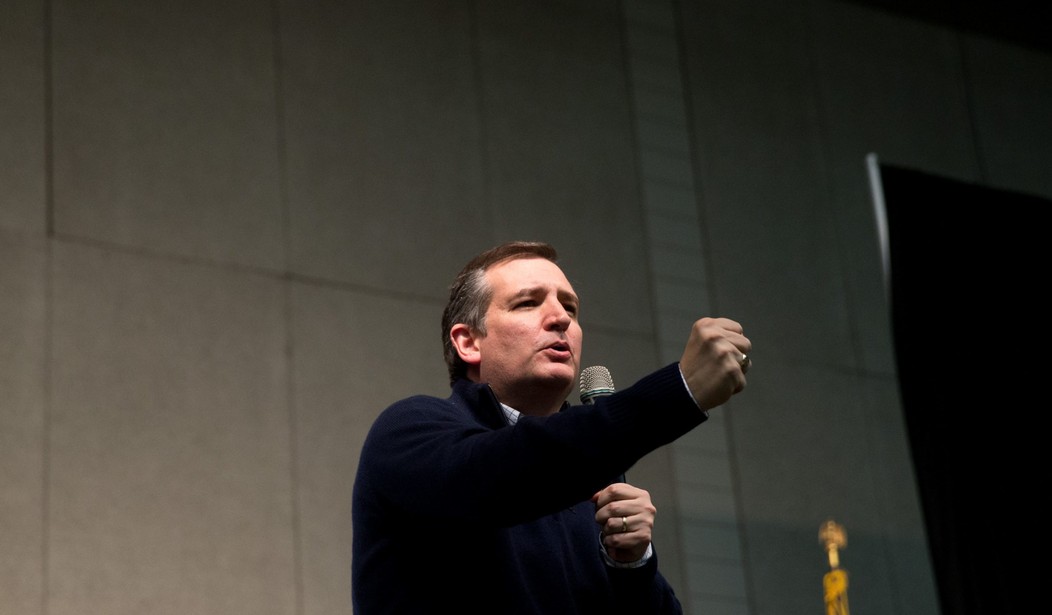On Tuesday night, as it became clear Donald Trump had won the Indiana primary, Ted Cruz suspended his campaign for the presidency. I would hope this decision was based on internal polling showing that he had no chance in California, but even so, this is a boneheaded mistake. Now, there is essentially no opposition to Donald Trump.
Cruz gave an amazing concession speech. His declaration that he would drop out is actually my favorite part:
And so, with a heavy heart, but with boundless optimism for the long term future of our nation, we are suspending our campaign. But hear me now, I am not suspending our fight for liberty. I am not suspending our fight to defend the constitution, to defend the Judeo-Christian values that built America. Our movement will continue, and I give you my word that I will continue this fight with all of my strength and all of my ability.
Nevertheless, I fundamentally disagree with his decision, for five key reasons.
1. He gives Donald Trump this satisfaction.
For the past few weeks, Republican frontrunner Donald Trump has been merciless to Ted Cruz. He refers to the Texas senator as “Lyin’ Ted,” constantly beat him up about the campaign flub in Iowa, and even threatened to “spill the beans” on Cruz’s wife. After that threat, the National Enquirer story leaked. Trump is well connected to the Enquirer’s editor, and just today he parroted a story about Ted Cruz’s father, alleging a connection between Rafael Cruz and the assassination of John F. Kennedy.
As the polls began to close in Indiana, The Donald tweeted this.
Lyin’ Ted Cruz consistently said that he will, and must, win Indiana. If he doesn’t he should drop out of the race-stop wasting time & money
— Donald J. Trump (@realDonaldTrump) May 3, 2016
By withdrawing from the race on Tuesday evening, Cruz gave Trump the satisfaction of forcing his competition out of the race. This is the kind of giving in to bullies that only emboldens them further. The speech was dignified, but it was beneath Cruz to surrender like that, because…
Next Page: Indiana should not have been considered Cruz country.
2. Indiana should not have been considered Cruz country.
As I wrote this morning, those who know Indiana better had it pegged for Donald Trump. There were some superficial reasons to think Cruz should be the favorite there, such as the high share of voters who identified as evangelical Protestants and the fact that Tea Party challenger Richard Mourdock won the U.S. Senate primary there in 2012.
But Indiana is the poorest of midwestern states, and has a large manufacturing base — two central facets of Trump country. Much of the state’s population hails from the South, where Trump won big, and like in the South, Indiana has low levels of church attendance, which is a better predictor for the Cruz-Trump split than identifying as an “evangelical.”
These differences explain why Cruz might have alienated some Indiana voters on social issues by supporting the common-sense North Carolina bathroom bill which nonetheless inspired a great deal of hatred from the business community.
The conventional wisdom was, if Cruz couldn’t win here, he can’t win anywhere. Well, that’s bunk. This state should have been written off for Trump. The real reason it wasn’t is because Indiana’s Republican Party decided to award delegates in a winner-take-all fashion, thus making it a key stop-gap in the battle to stop Trump.
Nevertheless, this wasn’t the last battle in that fight (until Cruz dropped out). There was still a slight chance at pushing a contested convention, and at convincing pledged delegates to not vote for Trump.
Next Page: California and the convention battle.
3. California and the convention battle.
After Indiana, there was one state that could have stopped a Trump victory. California, with its 172 delegates, was unlikely to break against Trump by the huge margin necessary to stop him from winning — but that doesn’t mean the fight would have been impossible. It would have been a long, hard slog over the next month to try to convince a majority of voters in each congressional district to deny Trump the support he needs, but it would have been possible.
Furthermore, there was a hint of an even deeper opposition. On Thursday, the Wall Street Journal‘s Kimberley Strassel wrote that almost half of the delegates who are pledged to vote for Donald Trump at the July convention in Cleveland, Ohio, were considering breaking their pledges.
But aren’t his delegates “pledged” to vote for him on the first ballot, regardless? A vocal—and growing—faction of delegates is saying they are not. A ringleader is Curly Haugland, an unbound delegate from North Dakota, and a longtime member of the GOP’s rules committee. In an open letter in March, he argued that there was only one convention in history (1976) in which GOP delegates were “bound,” and that this requirement was rescinded in 1980. He says delegates can vote their conscience.
Is he right? What matters is that some delegates think so. Many are unhappy that their state legislatures have imposed “open primaries” that allow independents and Democrats to vote. Many view it as a bedrock constitutional principle that a party retains its right to choose its own nominee. Many are deeply troubled by Mr. Trump. Some are just ornery.
With razor-tight margins, it wouldn’t take much to upturn the convention—even if Mr. Trump does get 1,237 “pledged” delegates. All it would take is a small (potentially very small) bloc of Trump delegates to defect—or simply abstain—that first round. The outrage from Trump supporters would be huge. Then again, many delegates have concluded that outrage from one side or another is inevitable. So pick your poison.
Before Cruz dropped out of the race, Haugland had a good argument — those delegates could back a candidate who had gotten nearly as many votes as the frontrunner. Ted Cruz’s wooing of actual delegates could have propelled him to victory if the voting went to a second or third ballot. Now, those delates are likely to lapse into supporting Trump as the “inevitable” nominee.
It is arguable Cruz “saved the Republican Party” by not forcing this defection, but even if he had decided not to pursue the nomination, the Texas senator could still have done something nearly as important.
Next Page: Cruz could have influenced the party platform.
4. Ted Cruz could have led his delegates to strengthen the GOP platform.
There is more to a national convention than selecting a presidential nominee. Some of the most important work centers on party rules and drafting the document that defines the party for that election — and the three years afterwards.
Ted Cruz had shown an immense ability to target the actual people who are delegates to the convention, and to get his own delegates elected to those positions. Even if he could not have become the nominee by leveraging their support, he could at least have led them to push a very conservative party platform, making the Republican Party the conservative party it should be. After the Tea Party, the voters deserve nothing less.
However, by prematurely quitting the race, Cruz has sacrificed his shot at pushing the party to the right. This is very significant, because Donald Trump’s positions are notoriously fickle. His record is far worse than any compromise John McCain or Mitt Romney pushed, and that’s not even mentioning his character. If Trump’s policy positions determine the Republican Party platform, conservatives won’t just be burning their voter registration cards in protest — they’ll permanently leave the G.O.P.
By staying in, despite being unable to win, and rallying his delegates to support a conservative platform, Ted Cruz could have brought the fight to Cleveland — not trying to be the presidential nominee, but solidifying the Republican Party’s meaning as a conservative party. Now, it looks as though we are headed for a populist center, rather than a conservative one.
Next Page: A final, moral struggle to the bitter end.
5. The final, moral struggle to the bitter end.
Even if Cruz could not have been the nominee, or a leading voice in the party platform, he could at least have maintained his position as the key standard-bearer of the #NeverTrump movement. Conservatives and Christians who cannot bring themselves to back the serial philanderer and crony capitalist who now sits atop the G.O.P. could at least point to one stalwart leader who opposed The Donald to the bitter end.
This moral fight is important, and Cruz showed the ability to lead it well. He consistently declared that his was the only campaign to defeat Trump, and he presented a strong, anti-establishment message that could have united angry Republicans against the weaknesses of their own party. His crusade against The Donald was the last hope of conservatives who had seen Scott Walker, Marco Rubio, and countless others fall to the $2 billion of free media Trump received.
In the end, a liberal menace far worse than any establishment Republican (did Romney or McCain give money to Hillary Clinton?) has coopted the party, and now conservatives have lost the key voice who consistently opposed him. Ted Cruz was, if nothing else, a moral hero, standing athwart history yelling stop at the top of his lungs. Now, the silence is deafening.









Join the conversation as a VIP Member